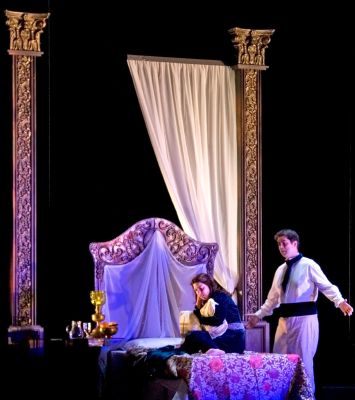|
<<< << -- 4 -- Roderic Dunnett BRILLIANTLY ENGAGING

Rather weakly moved on the very good set by Nigel Hook, which converted bedroom to family vault with skilful ease and provided a picture-frame like feel oddly akin to David McVicar's, Chaundy's Romeo cuts a rather feeble figure at the outset. But his biggest outpouring comes in a superbly varied and passionate aria Benda allocates him in the last Act (the well-managed tomb scene, led in by a sensational mourning chorus of Verdian intensity, terrifically acted and directed), in which soloists and orchestra under the King's Consort and Amsterdam Baroque's Matthew Halls -- not too practised in bringing out real liveliness in this charming but acoustically not unproblematic outdoor setting -- both excelled.
Even Capulet (Adrian Powter) gets a basso scena or two, part-comic in its sheer histrionics, in part extremely touching. There is no nurse, but a soubrette, a friend (Laura) who is a bit of a moralising pain, plus a mysterious aunt Camilla, from nowhere in Shakespeare, who seems to be the eminence not just grise but gruesome. Ilona Domnich sang Laura's set pieces with a very nice vocal character and fluency, even if her acting -- dull, stolid, imagination-free -- was little better than a kitchen extra.
Jeremy Gray suggested in his very pertinent talk beforehand that the opera should really be Juliet and Romeo (a bit along the lines of Berlioz's Capulets and Montagues). Gray also hinted at some Benda influence on Berlioz -- and my goodness, you could hear it in the music: Cleopatra, Dido, Romeo and Juliet -- you name it. The two or three biggest scenas are for Juliet, all meaty ones. And what heaven they were, in Joana Seara's delicate and tender hands. This gorgeous young soprano has everything one could desire vocally. It's a more refined voice than, say Bottone's famously raunchy, sensual soprano -- more a Natalie Dessay than a bare-it-all Jessye Norman -- though both have brought fabulous coloratura gifts to make Bampton better and brighter than ever. The delicacy of each move of Juliet, each half-line uttered, was touching in the extreme: a mark, too, of the subtlety of Benda's dramatic vocal layout, with a feeling for word-setting that explains Mozart's profound admiration for him. As a result, the glories of this completely neglected music beamed out -- as so often with Bampton's boldly-imagined and resiliently-researched choice of repertoire.

Juliet (Joana Seara) and Romeo (Mark Chaundy) during Act I at the UK première staging at Buxton Opera House. Photo © 2007 Anthony Hall
|
There was indeed, as Gray told us there would be, a feel of not just the pathetic, abandoned Ariadne but the steely, unflinching Medea about this Juliet. Which is exactly what Shakespeare intended for this gutsy, older-than-her-young years girl, who seems in the original to epitomise the very end of a medieval era and parentally-imprisoned ethos in her eagerness to sealed the wedded knot, at not quite age fourteen. A thing of the past? No, a girl very much of our own era, and a tale of modern-day liberation. Brilliantly engaging: Benda emerged triumphant, Bohemia shone like a beacon, and Bampton blossomed yet again.
Copyright © 2 September 2007
Roderic Dunnett, Coventry UK
 BAMPTON CLASSICAL OPERA
BAMPTON CLASSICAL OPERA
|

